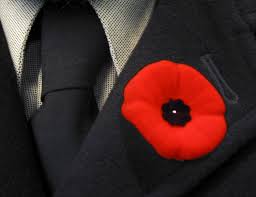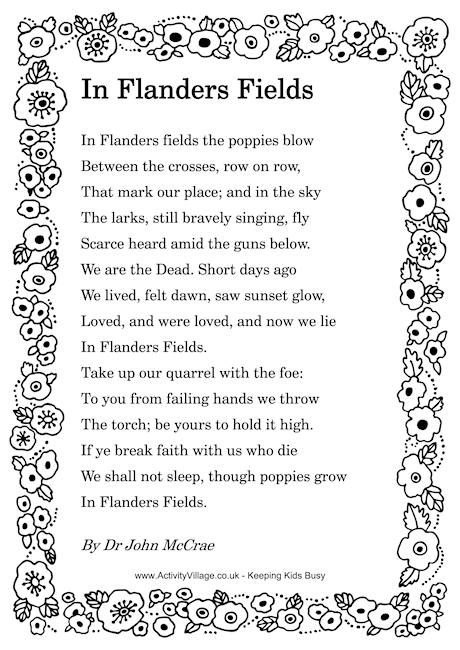Long-time followers will recognize this; for you newer followers this post is a variation on a subject I speak about on this day every year.
The armistice that ended battlefield hostilities during World War I started at the eleventh hour, on the eleventh day, of the eleventh month in 1918. Here in Canada as well as in other Commonwealth countries, wearing a Red Poppy on the left lapel, the one closest to the heart, is a tradition we use to mark this event.
Though now over a century after the end of the Great War, government and financial institutions are the only ones to actually take the day off, November 11th is still a National Holiday here called Remembrance Day.
In the United States November 11th is also observed as Veteran’s Day.
Now you can talk to me about the pointlessness of war. How violence is not the answer. Or how it is wrong for well-off, well-fed, middle-aged (mostly) white men to send our youth off to fight their battles for them; and on 364 days of the year I’ll probably agree with a fair amount of what you have to say.
But just not today, alright? Today, November 11th we pay our respects to those who served in all wars, and especially to those who were lost, at home and abroad.
Speaking to younger people it saddens me to find that so few know how this tradition started.
It’s a fascinating story that stems from one of the most iconic pieces of Canadian literature ever written. I’m referring of course to the poem In Flanders Fields by Lieutenant Colonel John McCrae which was taught to every child of my generation and recited each year in grade school.
In fact this poem is such an ingrained part of Canadian heritage that until 2013 when we switched from paper to polymer money, an excerpt from the poem was included on the back of our ten dollar bill.
McCrae who was born in Guelph Ontario, was a 41-year-old doctor serving with the Canadian artillary during the second battle of Ypres, in the Flanders region of Belgium.
On May 2nd, 1915 during a particularly brutal offensive by the Germans, McCrae witnessed the death of Alexis Helmer, a 22-year-old friend and former student of his from his teaching days at McGill University in Montreal.
Legend has it that during a short break in the hellish battle, McCrae and Helmer were smoking a cigarette away from the trenches. Helmer was exuberantly telling McCrae about his plans for after the war and how he hoped to marry his sweetheart when he got back home.
A few minutes later as they tossed aside their cigarette butts and went their separate ways back to their posts, McCrae heard that unmistakable whistling sound of an incoming mortar shell. The nearby explosion rocked him and he turned to see if Helmer was alright, only to discover that the young man had sustained a direct hit; his body was blown to pieces.
The following day after presiding over his friend’s funeral and burying what remains could be collected, McCrae took a solitary stroll to a remote corner of their makeshift cemetery. Alone with his thoughts as he looked out over a field of poppies that swayed in the breeze, he was seen scribbling intently in his notepad.
This is what he wrote:
Apparently McCrae wasn’t happy with the poem, or perhaps it was just the sense of overwhelming futility of it all. Whatever the reason, he tore the page from his notebook, crumpled it up and discarded it. It was picked up by someone who had been watching him and forwarded on to a military journal where it was published. It gradually gained in popularity and became one of the most famous war poems of all time.
Though John McCrae didn’t make it home from the war either, his words live on. Through his poem poppies became a symbol that is still used to this day as a way to remember and pay tribute to those who served and sacrificed in that and all subsequent wars.
Here in Canada the yearly Poppy Campaign is organized by the Royal Canadian Legion. In a normal year, by late October veterans don their uniforms and fan out across the country in shopping malls and other places where people go in large numbers. They stand quietly with their boxes of poppies and tin can to collect donations. The money raised is used to help provide anything not covered by government-funded veteran’s services and to offer additional assistance to the families of those who have fallen.
There is no specific price. For each Poppy you take you can give as much or as little as you can afford. This year with lockdowns, physical distancing, and other public safety regulations in place due to the pandemic, the Legion’s fundraising activities have been severely hampered. The Legion has adjusted as best they can and thanks to the help of a number of major retailers, poppies will still be available this year, just in significantly fewer locations than usual.
With this in mind fellow Canadians, here’s a link to the Legion’s online fundraising portal for the Poppy Fund. If you’re budget allows for it, please consider making a donation and give a little back to those who have given us so much. And if you’re curious here’s a link to the list of ways donations are used to help our veterans.
If your budget doesn’t allow for a donation then please, if you do cross paths with a veteran this week take a moment out of your busy day to offer them a respectful and heartfelt, “Thank you for your service.”
Thank you to all who serve!






Hear, hear Norm! It is very important that young people learn and understand, and thank the veterans who served our country – Canada or America. Every year I make sure my preschool class does just that.
LikeLiked by 1 person
Thank you, Norm.
LikeLiked by 1 person
At the WW1 museum in KC MO, the entrance is a glass floor with hundreds of poppies underneath to walk over. I absolutely love your tribute! Well done!
LikeLiked by 1 person
What a wonderful post. Hugs Norm! I’ll never forget the moat filled with plastic red poppies outside the Tower of London four years ago. What a sight.
LikeLiked by 1 person
An excellent post, thank you Norm.
LikeLiked by 1 person
My father used to recite that poem on this day. He never called today Veterans Day though, he called it Armistice Day. He was old school to the end.
LikeLiked by 1 person
Thank you Ally 🙂
LikeLike
I remember the poem from school, but didn’t know the author was Canadian.
I think the increasing ease with which family history can be researched online is helping to increase awareness of the sacrifices made by servicemen and women. I’ve accessed the service files for several ancestors who served, and died, in WWI and have been sharing their stories with younger family members.
Thanks for this post Norm; we need these on-going reminders.
LikeLiked by 1 person
Thank you Su 🙂
LikeLiked by 1 person
I always enjoy, if that’s the right word, your post on this day. Perhaps “deeply appreciate” would be better. WWI tends to be overshadowed by the next Great War. That poem always tugs at my heart.
janet
LikeLiked by 2 people
Thanks Janet 🙂
LikeLike
Lovely blog Norm
LikeLiked by 1 person
Thanks. Glad you liked it 🙂
LikeLiked by 1 person
What a beautiful post, Norm. Thank you!
LikeLiked by 1 person
Thanks for reading 🙂
LikeLike
This is a beautiful post, Norm. Thank you for reminding us (and informing many) of the reason we stop on this day to honor those who have served and those who serve today.
LikeLiked by 1 person
Absolutely. Thank you Dan.
LikeLiked by 1 person
I’ve always found this one of the most poignant of WWI poems (along with Owen’s Anthem for Doomed Youth). Maybe that’s because he wasn’t really a poet, just a bereaved friend trying to come to terms with what he had witnessed?
LikeLiked by 2 people
Thank you. That’s a very good point 🙂
LikeLiked by 1 person
I was famliar with the poem but not the story. Thank you for sharing it.
LikeLiked by 1 person
Thank you for reading 🙂
LikeLiked by 1 person
Happy Veterans to all those in the free countries! Let freedom ring!
LikeLiked by 1 person
Yes indeed – thank you!
LikeLiked by 1 person
Thank you Norm for telling his story. I am sadden by how few Canadians know of him. I wear my poppy with pride.
LikeLiked by 1 person
Thank you! We couldn’t find anyone selling them around here this year but we did make a donation online.
LikeLike
Well said, Norm, and we can always use a reminder to appreciate and acknowledge each and every Veteran. When I was a child, I remember buying a poppy from Veterans, but I have not seen one sold here in many years. I wish we were as diligent about the memory as Canada.
LikeLiked by 1 person
Thank you. People won’t remember if we don’t keep the stories alive. That’s why I try to repeat the message every year.
LikeLiked by 1 person
A beautiful post. I have visited Ypres or Wipers as it was referred to by the first World War soldiers. Although the buildings have been carefully restored it still has a very foreboding atmosphere.
LikeLiked by 2 people
Thanks Anne. I can imagine that visiting any of those war memorial sites would be a sobering experience.
LikeLike